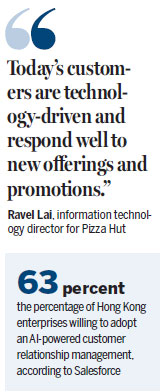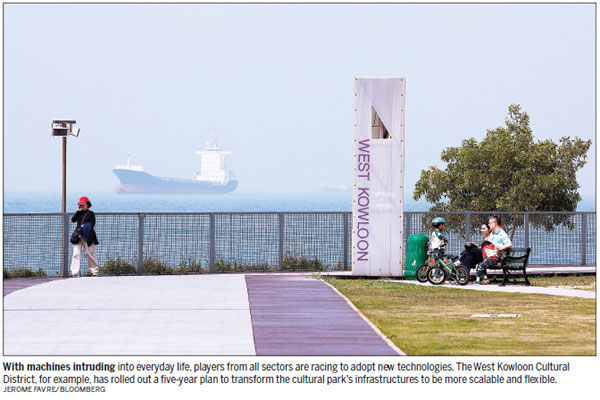Robotic brains - the countdown begins
Updated: 2017-10-27 06:20
By Oswald Chanin Hong Kong(HK Edition)
|
|||||||||
HK companies ponder as enterprises worldwide turn to artificial intelligence
With robotics already fast creeping into certain sectors of everyday life, particularly in enterprises, the day when robots start wresting the baton from humans as you shop, dine or check in at a hotel seems destined to be not that far off.
As machines are now capable of generating a series of intelligent human behaviors by performing high value-added services, businesses should start preparing themselves to invest in artificial intelligence (AI) before it's too late.
The West Kowloon Cultural District Authority (WKCDA) has got the ball rolling by adopting AI at Hong Kong's cultural showpiece - the West Kowloon Cultural District (WKCD) - from July this year.
The first stage of such technology services will be deployed in the fields of marketing and fundraising, followed by the provision of customer services, such as dealing with customers' enquiries and soliciting their feedbacks. In the third stage, the AI platform will be leveraged to offer ticketing and vendor services.
"Capitalizing on AI can help the audience-building process, while WKCD visitors can get great experience from appreciating the cultural activities to be held there in future," said WKCDA Chief Technology Officer Emily Chan Fung-ying.
The WKCDA has rolled out a five-year plan to transform the cultural park's infrastructures to be more scalable and flexible. For example, the company has formulated a location-based strategy to extend the number of Wi-Fi hotspots as much as possible. The private cloud of the data center located within Xiqu Centre, which is scheduled to open next year, will be connected to public cloud in due course to facilitate the management of videos and art print collections digitally.
"By applying AI technology, the system can gather all customer information, and we can also generate the information that visitors need to get them to visit the park again," Chan said.
Besides the technology, the WKCD has introduced a completely autonomous vehicle that will be tested at its Nursery Park in the coming months. The French-made, 100-percent self-driving and environment-friendly car is equipped with sensors and different technologies to allow for efficient mobility propelled by full 3D vision within the cultural park. The WKCDA will determine how many such cars should be ordered, based on market demand.
The cultural park operator said, however, there's no plan to deploy robotics at this moment, adding that the matter will be looked into when the need arises.
The WKCDA is not alone as more local enterprises begin leveraging AI to maximize business performance.
Jardine Restaurant Group's Pizza Hut launched its digital marketing strategy as far back as 2006 by adopting the marketing cloud that integrates ordering systems, in-store point of sales, customer segmentation and big data analytics.
With the marketing cloud in play, Pizza Hut has eliminated paper-based coupons and switched 200,000 customers from membership cards to its loyalty app with its current loyalty membership standing at 420,000.
The Pizza Hut app utilizing marketing cloud now supports triggers, such as new offers, alerts and coupons, in response to events like membership sign-up, pizza orders, points sharing and interactions online. Looking ahead, the restaurant will add new promotions for its existing marketing cloud, including a gold membership journey and birthday promotions. Lucky draw coupons and online promotions are also on the menu.

The Pizza Hut loyalty app has been downloaded by 350,000 customers since its introduction in mid-2015, helping to boost sales by 28 percent.
"Today's customers are technology-driven and respond well to new offerings and promotions," said Ravel Lai, information technology director for Pizza Hut, PHD and KFC franchises in Asia at Jardine Restaurant Group.
"We know so much more than we did before. It's really exciting for us to link customer data and mobile apps, and to understand the connection between customers and purchase triggers."
Shopline - the online shop for small and medium enterprises - also adopts sales cloud to process more leads without increasing head count or compromising services. Using sales cloud, Shopline has a comprehensive view of customer interactions across all integrated apps in all locations.
Because these leads come from a range of sources, including digital marketing, content marketing and a hotline, the system also helps to evaluate different methods of customer acquisition and monitor team performance.
The AI analytics tool further enables Shopline to evaluate lead sources and the sales team's closing rates. The technology allows the company to drive more targeted leads and help decide where to invest resources in growing channels or conducting campaigns.
"Understanding the customer contributes greatly to helping them succeed, thus facilitating Asian merchants in pursuing their localization strategy to build an e-commerce business in their respective markets", Shopline Co-founder and Chief Operating Officer Fiona Lau said.
AI is a branch of computer science that deals with the simulation of human behaviors in computers to provide a range of customer services. The technology is increasingly being adopted in the whole value chain of economic activities.
According to a report by PricewaterhouseCoopers (PwC), such technology is projected to contribute $15.7 trillion to the global economy in 2030, pushing the global gross domestic product (GDP) 14 percent higher during the same period.
PwC envisioned that the greatest economic gains from AI will be seen on the Chinese mainland (with a 26-percent GDP boost in 2030) and North America (14.5 percent up), while Europe and developed Asian countries will see 9 to 12-percent GDP growth by AI adoption.
The biggest absolute gains will be in the retail, financial services and healthcare sectors, as AI raises productivity, product value and consumption, PwC said, adding that image-based diagnostics, on-demand production and autonomous traffic control will enjoy the greatest growth potential.
Another survey by India-based Tata Consultancy Services in September revealed that 80 percent of business executives from 835 companies across 13 global industry sectors said they're already investing in AI, and almost 100 percent will do so by 2020. By using the technology, these businesses can enhance revenues by an average of 17 percent and reduce costs by an average of 12 percent.
According to the survey, the increases are the most dramatic among industries with the lowest current investment levels, including the travel, transport and hospitality sectors, followed by the media, entertainment and information services, industrial manufacturing, healthcare, and banking and finance.
In Hong Kong, AI will most likely be applied in areas like customer relationship management (CRM), financial services such as loan analysis, medical services and retail services, industry pundits anticipate.
However, Hong Kong companies are still lukewarm to adopting the technology at this stage.
Only 63 percent of the surveyed Hong Kong enterprises are willing to adopt an AI-powered CRM platform - the least ratio recorded among eight Asia-Pacific countries and regions, according to CRM service provider Salesforce, which interviewed 707 companies in that region late last year.
"Costs, access to right market skills and the ability to keep the rate of changes are the three essential factors restricting Hong Kong companies in embracing the AI technology further," said Salesforce Regional Vice-President Robert Wickham.
Nonetheless, he's optimistic that Hong Kong businesses will be more receptive to the technology because it will become a basic necessity, just like electricity that any company must have to survive.
"The rise of globalization is unleashing market forces propelling the widespread AI adoption that will render intelligent assistance to employees and strengthen their productivity," Wickham envisaged.
According to a report by global advisory firm Accenture, AI application would raise productivity worldwide by up to 40 percent in 2035.
oswald@chinadailyhk.com

(HK Edition 10/27/2017 page8)